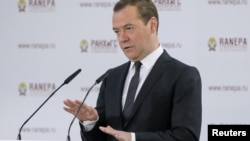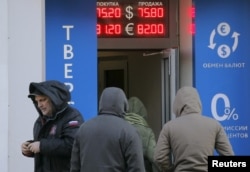Russian Prime Minister Dmitry Medvedev said the Russian economy is looking better than one year ago but must prepare for the worst-case scenario as it continues to suffer from low oil prices and the impact of Western sanctions.
Speaking Wednesday in Moscow at the annual Gaidar Forum on economics, Medvedev noted 2015 was probably the most difficult year for Russia economically in the past decade. “The piling of the problems of this year resulted in the contraction in the volume of production and reduction in business and entrepreneurial activity,” he said.
Russia’s economy contracted 3.8 percent last year as oil, its major export, dropped in price by 70 percent to $30 a barrel. Western sanctions against Russia, because of its 2014 annexation of Crimea and continued military backing for rebels in eastern Ukraine, cut off its banks from international credit. The value of the ruble has dropped from a high of 30 to the dollar to around 75.
While inflation in 2015 stood at 15.5 percent, consumer food prices jumped by 20 percent to 30 percent. The number of Russians below subsistence poverty rose to more than 20 million last year from 18 million a year earlier.
Impact on incomes
Medvedev said the gravest result was the fall in real incomes. “Many people have become poorer,” he said. “And, the middle class has suffered. And, this is probably one of the most painful aftereffects of the last years.”
Russian officials, however, expect the economy to stop its downward spiral this year and that inflation will drop to single digits in February. The prime minister touted his government’s anti-crisis plan for reducing external shocks and said, despite the damage, the economy was not in tatters. “Russia is in [the] top 10 countries with the lowest public debt and greatest foreign exchange reserves. And, that really provides for the resilience of our financial system.”
The prime minister acknowledged the federal budget, half of which depends on oil export revenues, would likely have to be cut. “The reserves have managed to balance the budget for this year,” he said. “But, if the oil price keeps falling and dropping, we’ll have to adjust our fiscal parameters.” Medvedev added, “And, let’s brace ourselves for the worst scenario, as other countries do.”
Cuts in federal spending
Russian officials said they were making plans to cut federal spending by an additional 10 percent after a similar across-the-board cut last year.
Russia’s 2016 budget was made in October on the assumption of $50 a barrel for oil prices but, many analysts say the more likely price is between $30 and $40 and could even drop below $20.
Finance Minister Anton Siluanov said the budget could only balance this year at $82 a barrel for oil. “We have to take well-thought-out measures on how to bring the budget in accordance with the new realities,” he said. “In the current difficult conditions, we must speak of a very thrifty, strict budget policy, in order not to end up with high deficit levels or a high volume of debt.”
Low oil prices could last decades
Economy Minister Alexei Ulyukayev told the forum low oil prices could last decades. He said another major risk would be if the public shifted from spending to saving.
Ulyukayev suggested further privatizing parts of Russian state banks to help them recapitalize. “The banking system’s capitalization should be boosted,” he said. “How can this be done at a time of budget restrictions and low demand for assets? I think we should return to the idea of privatization of… Sberbank and VTB," he said, referring to Russia's two largest banks.
Former finance minister Alexei Kudrin said even if the economy begins growing again, they should consider raising taxes and the retirement age, both politically sensitive issues in Russia, in order to meet social spending plans for the coming years. He said at least 4 percent growth in GDP was needed annually for the next five to seven years."In the fight against poverty, 60 percent is about economic growth and only 40 percent is about social protection [spending]."
Medvedev said a new model of economic growth was needed and that Russia would have to get used to low oil prices.





